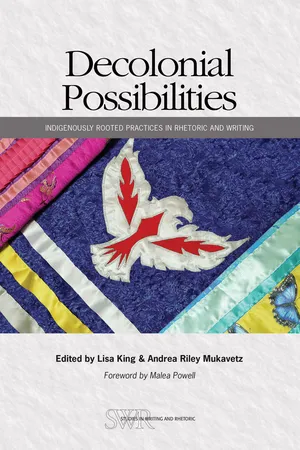
Decolonial Possibilities
Indigenously Rooted Practices in Rhetoric and Writing
- English
- ePUB (mobile friendly)
- Available on iOS & Android
Decolonial Possibilities
Indigenously Rooted Practices in Rhetoric and Writing
About this book
Decolonial Possibilities takes up the call to decolonize the university in whatever ways possible, from teaching to administrative work to publishing. Curating perspectives from cultural and Indigenous rhetorics scholars associated with the NCTE/CCCC American Indian Caucus, editors Lisa King and Andrea Riley Mukavetz emphasize nourishing the intricate and diverse pathways necessary for meaningful decolonial work—work that requires intentional relationships with Native American and Indigenous communities within and beyond the university.
Tribal Nations and Indigenous people are diverse, and this collection of essays does not offer a universal approach to decolonizing the university. Rather, it aims to improve how those in rhetoric and composition think about and approach decoloniality and decolonization in their research, teaching, and professional interactions. Contributors draw attention to the challenges, pitfalls, joys, and labor of embedding decolonial theories, practices, and models into every facet of our discipline, while being attentive to the contributions, perspectives, and grassroots movements of Tribal Nations and Indigenous people.
Inside, you'll discover:
- Diverse perspectives from scholars who are deeply engaged in Indigenous and cultural rhetorics.
- Insights into the complexities and nuances of decolonial efforts in academia.
- Real-life examples of embedding decolonial theories into teaching and research.
- Discussions on the importance of building relationships with Native communities.
- Helpful insights into the experiences of contributors as they navigate their decolonial journeys.
Join us in exploring the enriching possibilities for decolonizing rhetoric and composition in higher education. CCCC Studies in Writing & Rhetoric (SWR) Series
Frequently asked questions
- Essential is ideal for learners and professionals who enjoy exploring a wide range of subjects. Access the Essential Library with 800,000+ trusted titles and best-sellers across business, personal growth, and the humanities. Includes unlimited reading time and Standard Read Aloud voice.
- Complete: Perfect for advanced learners and researchers needing full, unrestricted access. Unlock 1.4M+ books across hundreds of subjects, including academic and specialized titles. The Complete Plan also includes advanced features like Premium Read Aloud and Research Assistant.
Please note we cannot support devices running on iOS 13 and Android 7 or earlier. Learn more about using the app.
Information
Table of contents
- Cover
- Title
- Copyright
- Contents
- Foreword: Mending the Tears
- Acknowledgments
- Introducing Ourselves
- Introduction: Interventions to Highlight Decolonial Possibilities and Connections in Rhetoric and Writing Studies
- 1. Takissaawoo’: Indigenous Practices of Visiting as Pedagogical Praxis
- 2. Building Relationships as a Way to Engage in Decolonial Practice
- 3. Decolonial Practice as a Path for Community Kindness in the Classroom
- 4. Engaging Native Land and Indigenous Food Sovereignty in a Food Writing Classroom: A Decolonizing Pedagogical Practice
- 5. Tending the Fire: Graduate Mentoring as Decolonial Practice
- 6. A Writing Center’s Place Is in the #Community: Decolonizing Writing Center Administration
- 7. Invisibility and Colonial Logics: Narrative Reframing of Indigenous Presence on Campus
- 8. A Story of Parallel Worlds: Decolonial Possibilities Navigating Institutional Spaces
- 9. On Embodied Rhetorical Choices; or, Cultivating a Decolonial Approach to Publishing
- 10. Making Indigenous Space through Anishinaabeg Knowledge and Community Relations
- Index
- Editors
- Contributors